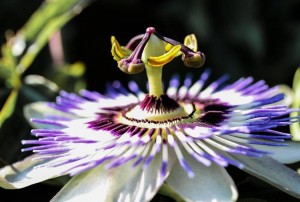Passionflower is a natural, non-addictive sedative that helps treat anxiety and sleep disorders. In the United States and Europe, passionflower is used as a calming herb for anxiety, insomnia, seizures, and hysteria.
There are about 500 species of passionflower. You may know some as passionfruit. There’s a variety of passionfruit: banana passionfruit, maypop, water lemon, wild maracuja. Passionflower is a large flower with 5 long stamens and 5 white petals, magenta to blue. In 1569, Spanish explorers in Peru discovered the plant and named it so because its corona resembles the crown of thorns worn by Jesus during the crucifixion.
Passionflower helps treat anxiety
When you suffer with GAD, your body is usually tense and you don’t sleep well. Passionflower has a calming, sleep inducing, muscle spasm relieving effect. Scientists believe passionflower works by increasing levels of a brain chemical called gamma aminobutyric acid (GABA). GABA lowers the activity of some brain cells, making you feel more relaxed. When you feel relaxed, your muscles have time to unwind and become loose.
Passionflower is used for sleep problems, particularly insomnia. Passionflower relieves gastrointestinal (GI) upset related to generalized anxiety disorder (GAD), and narcotic drug withdrawal symptoms. Studies of people with generalized anxiety disorder shows that passionflower is as effective as the drug oxazepam (Serax) for treating symptoms. Passionflower didn’t work as quickly as oxazepam (day 7 compared to day 4). However, it produced less impairment on job performance than oxazepam.
It’s easy to use passionflower for a calm, deep sleep at night. Simply adding a teaspoon of dried passion flower to tea can improve your quality of sleep.
Passionflower’s Other Uses
Passionflower is valuable for its pharmacological properties. The plant is frequently prescribed to treat seizures, hysteria, asthma, symptoms of menopause, attention deficit-hyperactivity disorder (ADHD), nervousness and excitability, palpitations, irregular heartbeat, high blood pressure, fibromyalgia, and pain relief.
Some people apply passionflower to the skin for hemorrhoids, burns, and pain and swelling (inflammation). This is because passionflower has alkaloids and flavonoids which have a tranquillizing effect.
Side effects
Like any other medical herb, passionflower may cause side effects and can interact harmfully with other medications. Passionflower is not recommended if you are pregnant or suspect pregnancy because it stimulates uterine contractions.
Always ask your doctor if passionflower is okay for you, and make sure you monitor its effects. Stop immediately if you notice symptoms or experience pain. It’s a good idea to let others know you are taking passionflower and have them also monitor you for side effects.
Possible Drug Interactions
Sedatives (drugs that cause sleepiness) — Passionflower makes sedatives stronger. These sedatives are:
- Anticonvulsants such as phenytoin (Dilantin)
- Barbiturates
- Benzodiazepines, such as alprazolam (Xanax) and diazepam (Valium)
- Drugs for insomnia, such as zolpidem (Ambien), zaleplon (Sonata), eszopiclone (Lunesta), ramelteon (Rozerem)
- Tricyclic antidepressants, such as amitriptyline (Elavil), amoxapine, doxepin (Sinequan), and nortriptyline (Pamelor)
Blood thinners — Passionflower increases the amount of time blood needs to clot, so it will make the effects of blood thinning medications stronger and increase your risk of bleeding. Blood thinning drugs include:
- Clopidogrel (Plavix)
- Warfarin (Coumadin)
- Aspirin
Monoamine oxidase inhibitors (MAO inhibitors or MAOIs) — MAO inhibitors are an older class of antidepressants. Passionflower may increase the effects of MAOIs, as well as their side effects, which can be dangerous. These drugs include:
-
Isocarboxazid (Marplan)
-
Phenelzine (Nardil)
-
Tranylcypromine (Parnate)
Passionflower is generally recognized as safe when it comes to being used for medicinal purposes. The plant’s extract is used as food flavouring. It’s available in infusions, teas, liquid extracts, and tinctures. Most passionflower species have fruit that can be eaten by humans and in some countries, the plant spreads like a weed. Research suggests that passionflower is effective for inducing sleep and for calming a person with GAD.
Twitter: @tereziafarkas #holistic #plantbased #anxiety
* Click here to find out more about Terezia Farkas and Depression Help Free.


